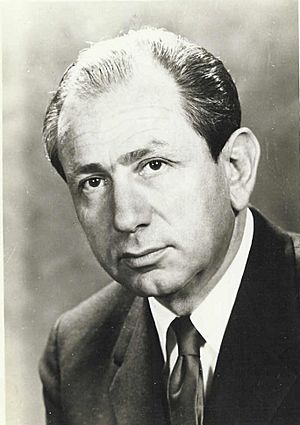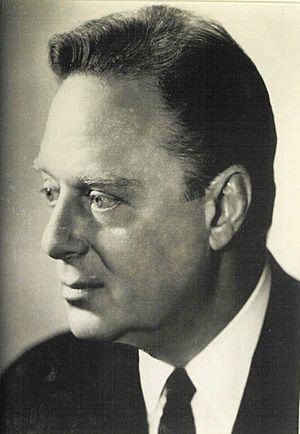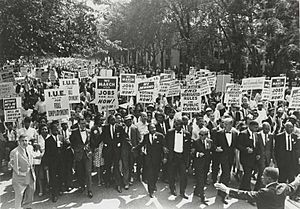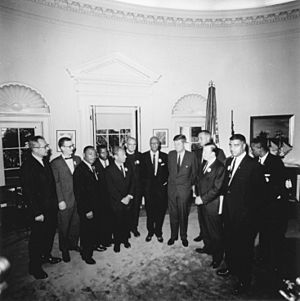Joachim Prinz facts for kids
Quick facts for kids
Joachim Prinz
|
|
|---|---|

Prinz in the 1970s
|
|
| Born | May 10, 1902 Bierdzan, Silesia, Prussia, German Empire
|
| Died | September 30, 1988 (aged 86) Livingston, New Jersey, U.S.
|
| Nationality | German-American |
| Alma mater | University of Giessen (Ph.D.) Jewish Theological Seminary of Breslau |
| Known for | Co-organizer of the March on Washington, Zionism |
| Spouse(s) |
Lucie Horovitz
(died 1931)Hilde Goldschmidt
(m. 1932) |
| Children | 4 |
Joachim Prinz (May 10, 1902 – September 30, 1988) was a German-American rabbi. He spoke out strongly against Nazism in Germany. He later became an important leader for Zionism, which supports a Jewish homeland. As a young rabbi in Berlin, he had to face the rise of the Nazis. He eventually moved to the United States in 1937.
In the U.S., he became a vice-chairman of the World Jewish Congress. He was also an active member of the World Zionist Organization. Prinz was a strong voice for civil rights. He even took part in the famous March on Washington for Jobs and Freedom.
Contents
Biography
Joachim Prinz was born in 1902. His birthplace was the village of Bierdzan. This village was near Oppeln in the Prussian region of Silesia.
Prinz grew up in a Jewish family. From a young age, he became very interested in Judaism. This interest grew even stronger after his mother passed away. By 1917, he had joined a group called Blau Weiss. This was a Zionist youth movement.
Education and Family Life
At 21, Joachim Prinz earned his Ph.D. in Philosophy. A Ph.D. is a very high university degree. He also studied Art History. He got his degree from the University of Giessen. He then became a rabbi at the Jewish Theological Seminary in Breslau.
He married Lucie Horovitz, whose father was a well-known professor at the seminary. Lucie died in Berlin in 1931. Their daughter, also named Lucie, was born shortly before her mother's death. Prinz married Hilde Goldschmidt in 1932. They had three children together: Michael, Jonathan, and Deborah. They also adopted another daughter, Jo Seelmann. Jo was Hilde’s cousin and had survived a Nazi concentration camp.
Moving to America
As Adolf Hitler and the Nazis gained power in Germany, Prinz became worried. His importance in Germany grew, but so did his fears. A famous rabbi named Rabbi Stephen Wise helped him. Rabbi Wise was a close advisor to President Franklin D. Roosevelt. In 1937, Prinz moved to the United States. Before he left, he gave a farewell speech. Thousands of people attended, including even Adolf Eichmann, a Nazi official.
Once in the U.S., Prinz began giving talks. He spoke for the United Palestine Appeal. This group raised money to support Jewish people in Palestine. It was an early step toward creating the nation of Israel. Joachim Prinz settled in New Jersey. He became the spiritual leader of Temple B'Nai Abraham in Newark, New Jersey.
Prinz passed away in 1988 from a heart attack. He was buried in the B'nai Abraham Memorial Park.
Activism
Joachim Prinz dedicated much of his life to fighting for rights. He believed everyone should be treated fairly.
Fighting for Jewish Rights
Prinz quickly became a top leader in Jewish organizations. He held important positions in the World Jewish Congress. He was also president of the American Jewish Congress from 1958 to 1966. He helped create the Conference of Presidents of Major American Jewish Organizations. This group brought together many important Jewish leaders. Prinz was its chairman from 1965 to 1967.
Prinz had been involved in the Zionist movement from early on. This made him a close friend of the people who founded Israel. He played a key role in supporting the new country.
Fighting for Broader Civil Rights
Dr. Prinz spent a lot of his time in the United States working for the Civil Rights Movement. He saw the struggles of African Americans. He compared their experiences to what he had seen under Hitler. In 1937, the year he moved to the U.S., he wrote about this. He said that Jews who had suffered in Germany could understand the struggles of Black people in America. He felt it was wrong for anyone to be treated badly.
From his early days in Newark, he spoke out against unfair treatment. Newark had a very large minority community. He joined protests across America. These protests were against unfair hiring, separate schools, and unequal housing.
As President of the American Jewish Congress, he helped organize the March on Washington for Jobs and Freedom. This huge march took place on August 28, 1963. Dr. Prinz spoke right before Martin Luther King Jr. gave his famous "I Have a Dream" speech. Prinz's speech is remembered for a powerful message. He said that the worst problem when people face unfairness is "silence." He meant that not speaking up is the most shameful thing.
Prinz attended King's funeral in April 1968. This was after King was assassinated.
Books
Joachim Prinz wrote several books during his life. Many of his early books were in German. They included books about Jewish history and Bible stories. Later, he wrote books in English. These explored topics like the challenges faced by modern Jews. He also wrote about popes from the ghetto and "secret Jews." His autobiography, Joachim Prinz, Rebellious Rabbi, was published after his death.
 | Anna J. Cooper |
 | Mary McLeod Bethune |
 | Lillie Mae Bradford |




